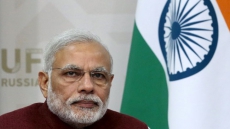ABBOTSFORD, B.C. — Indigenous leaders from across British Columbia and parts of the United States gathered at a sacred burial site in Abbotsford, B.C., to call for its protection by the provincial government.
From a grassy plateau overlooking farmland in the Fraser Valley, Sumas First Nation Chief Dalton Silver told those gathered they were standing on a mass grave where hundreds if not thousands of their ancestors are buried after a smallpox outbreak.
He says the Sto:lo and Sumas First Nations have been fighting for years to have the 65-hectare property known as Lightning Rock returned to them.
John Glazema of Cold Water Ranch Developments says his firm was among a group of development companies that purchased the site in 2011 with plans to build an agricultural mall but only learned of its spiritual and cultural significance a year later.
Since then, he says they have been in negotiations with the province to return the site to the Sumas people, but have yet to reach a settlement for their $12 million in costs.
More than a dozen Indigenous leaders, including former lieutenant-governor Steven Point and Grand Chief Stewart Phillip of the Union of B.C. Indian Chiefs, signed a joint letter to Premier John Horgan calling for its return.
Indigenous Relations Minister Scott Fraser was not immediately available for comment.
Phillip said the union has successfully advocated for the protection of other sites and he's optimistic that this one would be, too.
"We're on a mass burial site of our people," Silver told the crowd.
"We're going to keep pursuing this, to have this place returned to us."
Glazema said the developers stand with the nations, but the process has taken a toll on them and their families.
"We attempted to do everything right," he said. "We're fighting for our money back and paying huge interest costs."
Two years ago, they signed a letter of agreement with the province that appeared to set the stage for a settlement but it has not been forthcoming, he said.
They discovered early on in the process that some First Nations criteria had not been considered during the site's initial assessment.
"We are in unity with the Sumas nation," Glazema said.
